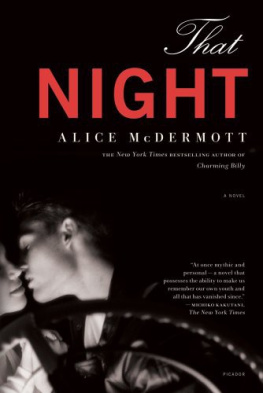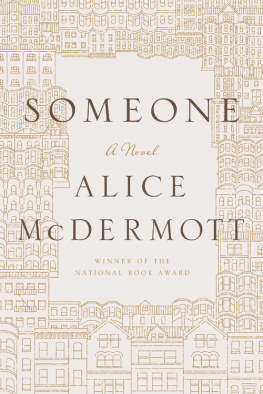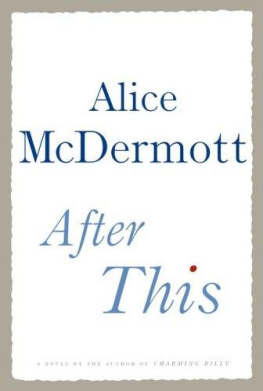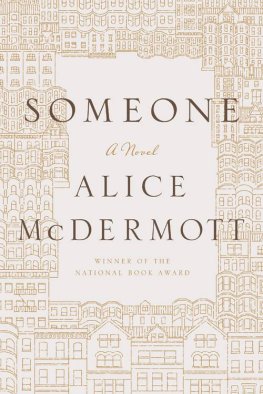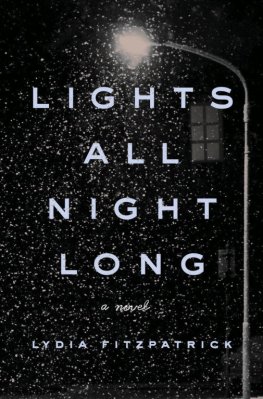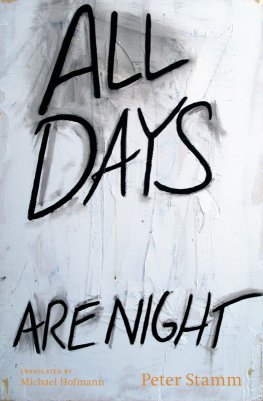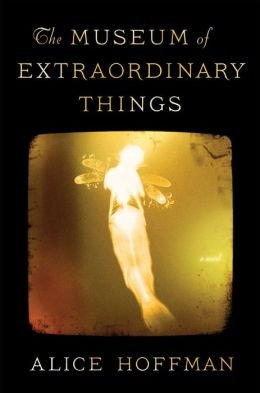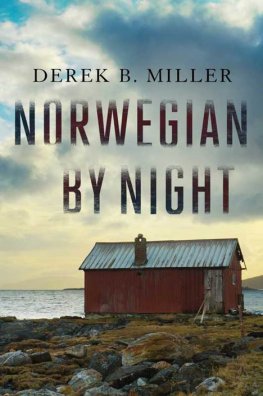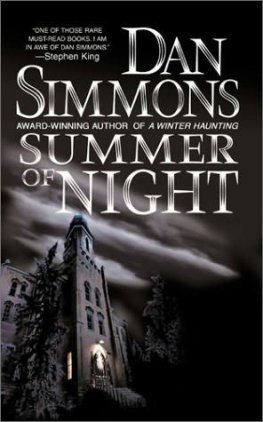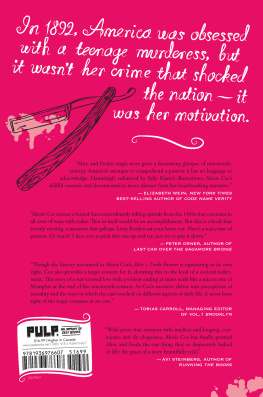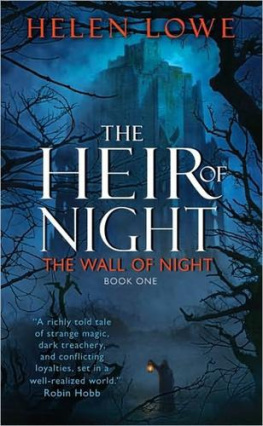THAT NIGHT
ALICE MCDERMOTT
Alice McDermotts A Bigamists Daughter, published when she was twenty-eight, won exceptional praise. That Night its remarkable talent for evoking a world and its inhabitants, and its subtlety and artfulness in telling a storyis an equally memorable achievement.
Alice McDermott was born and brought up on Long Island and now lives in La Jolla, California, with her husband and son. She teaches at the University of California at San Diego and is at work on a new novel.
Jacket illustration by Etienne Delenert
Jacket design 1987 by Rita Marshall
Author photo 1987 by M. A. Armstrong
Farrar Straus Giroux 19 Union Square West * New York 10003
Also by Alice McDermott
A Bigamists Daughter
ALICE McDERMOTT
THAT NIGHT.
FARRAR, STR AUS AND GIROUX/NEW YORK
MULTNOMAH County Library
Copyright 1987 by Alice McDermott
All rights reserved Published simultaneously in Canada by
Collins Publishers, Toronto Printed in the United States of America
First edition, 1987
Library of Congress Cataloging-in-Publication Data
McDermott, Alice
That Night.
I. Title. PS3563.C355T5 1986 813.54 84-45765
For David and in memory of Paul Briand
ONE.
That night when he came to claim her, he stood on the short lawn before her house, his knees bent, his fists driven into his thighs, and bellowed her name with such passion that even the friends who surrounded him, who had come to support him, to drag her from the house, to murder her family if they had to, let the chains they carried go limp in their hands. Even the men from our neighborhood, in Bermuda shorts or chinos, white T-shirts and gray suit pants, with baseball bats and snow shovels held before them like rifles, even they paused in their rush to protect her: the good and the badthe black-jacketed boys and the fathers in their light summer clothesstartled for that one moment before the fighting began by the terrible, piercing sound of his call.
This is serious, my own father remembered thinking at that moment. This is insane.
I remember only that my ten-year-old heart was stopped by the beauty of it all.
Sheryl was her name, but he cried, Sherry, drawing out the word, keening it, his voice both strong and desperate. There was a history of dark nights in the sound, something lovely, something dangerous.
One of the children had already begun to cry.
It was high summer, the early 1960s. The sky was a bright navy above the pitched roofs and the thick suburban trees. I hesitate to say that only Venus was bright, but there it was. I had noticed it earlier, when the three cars that were now in Sheryls driveway and up on her lawn had made their first pass through our neighborhood. Add a thin, rising moon if the symbolism troubles you: Venus was there.
Across the street, a sprinkler shot weak sprays of water, white in the growing darkness. Behind the idling motors of the boys cars you could still hear the collective gurgle of filters in backyard pools. Sheryls mother had already been pulled from the house, and she crouched on the grass by the front steps saying over and over again, Shes not here. Shes gone. The odor of their engines was like a gash across the ordinary summer air.
He called her again, doubled over now, crying, I think. Then he pitched forward, his boot slipping on the grass, so it seemed for a second hed be frustrated even in this, and once again ran toward the house. Sheryls mother cowered. The men and the boys met awkwardly on the square lawn. Until then, I had thought all violence was swift and surefooted, somehow sleek, even elegant. I was surprised to see how poor it really was, how laborious and hulking. I saw one of the men bend under the blow of what seemed a slow-moving chain, and then, just as gracelessly, swing his sons baseball bat into a teenagers ear. I saw the men and the boys leap on one another like obese, short-legged children, sliding and falling, raising chains that seemed to crumble backward onto their shoulders, moving bats and hoes and wide rakes that seemed as unwieldy as trees. There were no clever DArtagnan man mid-air meetings of chain and snow shovel, no eye-to-eye throat grip pings no witty retorts and well timed dodges, no winners. Only, in the growing darkness, a hundred dumb, unrhythmical movements, only blow after artless blow.
I was standing in the road before our neighbors house, frozen, as were all the other children scattered across the road and the sidewalk and the curbs as if in some wide ranging game of statues. I was certain, as were all the others, that my father would die.
Behind us, one of the mothers began to call her husbands name, and then the others, touching their throats or their thighs, one by one began to follow. Their thin voices were plaintive, even angry, as if this clumsy battle were the last disappointment they would bear, or as if, it seems to me now, they had begun to echo, even take up, that lovesick boys bitter cry.
They had first appeared just after dinner. Three cars-hot rods, we were still calling them then (not one of us imagining the phrase to be more than descriptive, never considering it somewhat obscene)--turning onto the north end of our block, moving slowly, steadily. I had just joined my parents on the front porch. I saw my mother raise her chin to look over the wrought-iron railing and the rhododendron bush as each car stopped at our corner, one waiting patiently for the next, like cars carrying beauty queens in a stalled parade, and then, just as slowly, carefully, they turned to the right.
We could see they were full of teenagers; there was an impression of black leather elbows at each window, black hair, sunglasses. No radios were playing and so only the sound of the straining, impatient motors seemed threatening. Like a big man snoring, I thought, or a dog growling in his sleep. I cant recall at all the cars colors or their makes. A Chevy of some sort, no doubt, say turquoise or sky blue, then a dark one, say a dark green Ford with tinted windows (and the tinted windows must be true because Sheryls boyfriend was in that second car, pressed into the back seat between two others, and none of us saw him until the cars, after who knows how many slow circuits of our street, suddenly turned with a sound like an explosion and drove onto her driveway and up over her lawn), the third perhaps a white Buick with one long red stripe that ended in a pitchfork or maybe a devils tail.
When they approached a second time, about ten minutes later, again turning onto the far end of our street and still maintaining that patient, creeping speed, my mother said, Uh-oh.
As the last car once again rounded our corner, making a left this time, I saw Sheryls neighbor, Mr. Rossi, standing at his front door. He wore a T-shirt and suit trousers and held a folded newspaper in one hand. His short, thick arms were both stained with darkening tattoos. He turned away only when the low rumble of their engines, which did not change even after theyd left our block, had faded completely.
I once thought they had been wise to maintain this slow speed even after theyd left our street, to slowly cruise a dozen blocks, to spread suspicion up and down the neighborhood, dissipating it, but now I wonder if they would have avoided suspicion altogether if theyd taken off, backfired, burned rubber.
This was not an especially rough town, but by then its residents must have simply resigned themselves to hoods and gangs and hot rodders, to teenagers in trouble, the way the first frontiers people must have resigned themselves to an occasional Indian raid, an occasional outlaw who shoots up the saloon. At that time, in our town at least, it was a given that hoods bombed around, intimidated the band members who tried to get past them into the pizza parlor, drank beer. Word was that some of them poured gasoline over stray cats and set them on fire, screamed Fung-goo la into old ladies bedroom windows in the middle of the night, smoked reeferthat one had pulled and used a knife on a geography teacher (something I recalled only years later, when our university announced it was cutting the entire geography department), that another had run his car into the dry cleaners window, but essentially, they were innocents. When they got out of hand the police could be called and, without nightsticks or tear gas, scatter them.
Next page
